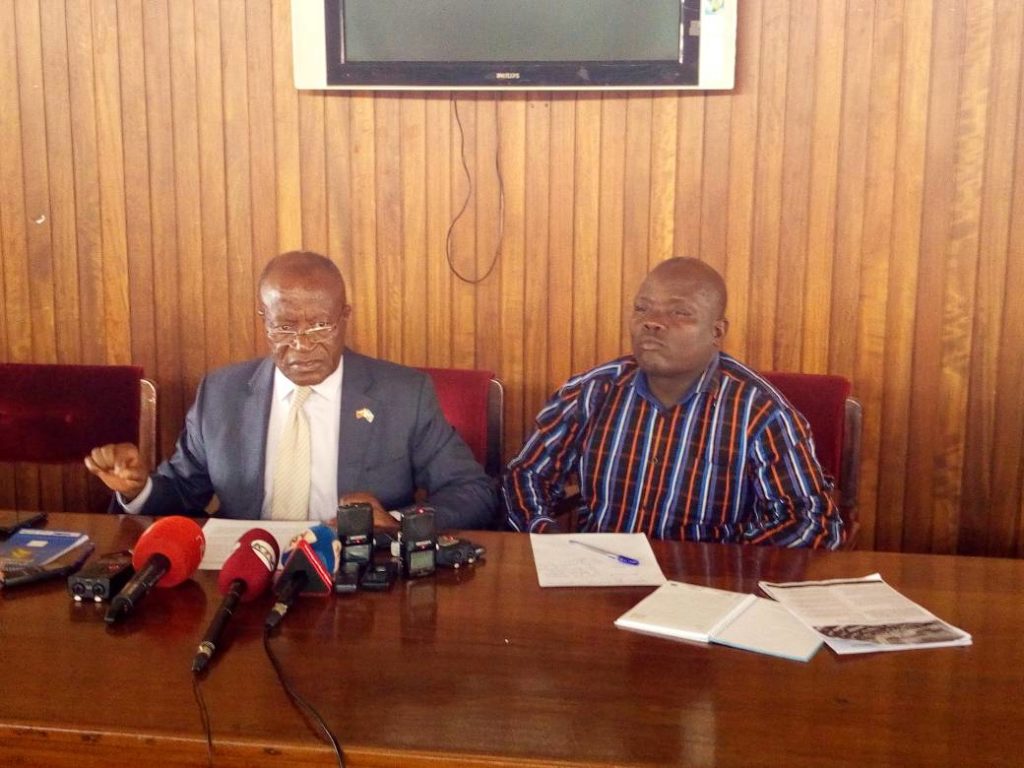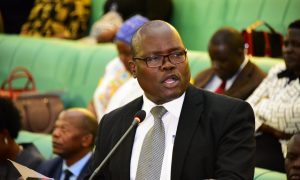
Bufumbira East County MP Nsaba Buturo and David Abala, Ngora County MP
A small section of lawmakers led by Bufumbira East County MP Nsaba Buturo and David Abala, Ngora County MP have vowed to fight the Biosafety bill.
This comes barely a day after minister of Science, Technology and Innovation, Elioda Tumwesigye re-tabled the controversial National Biotechnology and Biosafety Bill, 2012 also referred to as GMO Bill.
While addressing press conference on Friday, the MPs said that the GMOs Bill is disastrous to the country and lauded President Yoweri Museveni for refusing to assent to it.
However according to the Permanent Secretary of Ministry of Science, Technology and Innovation Mr. Obong O. O David, said that lawmakers have a right to give the opinions on bill though they also need to read to bill vividly and evaluate its relevance to the economic development of Uganda and the region large.
He says that due to the existence of threats related to climate change and other factors the agricultural sector is facing, hope of making these threats history has been put on the forefront with the introduction of Drought and pest resistant Genetically Modified Organisms (GMO) crops.
Obong adds that its unfortunate that a lot of farmers have continuously benefited less from their huge efforts injected in agribusiness yet the hope of reaping more and making Uganda Africa’s food basket is now being tackled.
“The biggest problem our people are facing is that they are not aware about this good move. With the adaptation of drought and pest resistant GM crops, Iam so sure that our economy will be boosted because the biggest percentage of Ugandans depends on farming which is the issue we are fighting for to see that its revamped with profit making, pest-free and internationally accepted varieties.” PS. Obong said.
He also says that the MPs claims of saying that the adaptation of the bill would undermine organic farming in Uganda, threaten our security, integrity, sovereignty and health as not being realistic since there is no threat greater than hunger crisis.
Obong adds that Cassava, Maize, Bananas, Rice, Sweet and Irish potatos are some of the crops that are targeted since they are the most food crops grown by Ugandan farmers yet they are the most affected crops by pests and unfriendly climate changes.
On 3rd and 4th October, 2017, MPs debated and passed the National Biotechnology and Biosafety Bill, 2012 also referred to as GMO Bill.
But on 21st December 2017, President Museveni declined to assent to the Bill and wrote to the Speaker, asking Parliament to clarify on the title of the Bill, patent rights of indigenous farmers and sanctions for scientists who mix GMOs with indigenous crops and animals before he signs the Bill.
The Bill was on Thursday re-tabled on the floor of parliament where it is expected to be returned to the committee on Science and Technology.
Facts about GM Crops and how they can boost the economy.
According to National Crops Resources Research Institute-Namulonge, About 86 per cent of farmers grow maize where also Maize Stem Borer contributes to about 30 per cent loss. Drought kills maize and causes a loss of $19.4m every year. Yet the economic benefits from adopting GM maize are estimated at $25.4m.
Banana Bacterial Wilt (BBW), Uganda loses $299.6m worth of bananas annually. Uganda is Africa’s leading banana producer and will lose that position if the problem continues. Naro has developed BBW-resistant genetically modified (GM) banana varieties. Over 13 million Ugandans depend on bananas for food and income.
Cassava Brown Streak Disease (CBSD) causes an annual loss of $24.2m. More than 10 million Ugandans consume cassava as main food and 75 per cent of farmers grow it. Naro has also developed CBSD-resistant GM cassava. Potential yield loss due to sweet potato weevil is 98 per cent. Uganda is Africa’s most important sweet potato producer but it may lose out. But adoption of GM potato could earn $16m annually.
It’s also revealed that Uganda consumes 175,000 metric tons of rice and we save $30m by growing it ourselves. But soil-related stress has hampered production, which scientists say can be resolved if we grow low-nitrogen and drought-resistant GM rice.
In this same plea, Uganda is still conducting field trials in Kasese, Namulonge, and Serere districts as the country awaits the passing of the Biosafety and Biotechnology Bill. Conventional drought-tolerant maize hybrids are currently marketed under the trademark DroughtTEGO after almost seven years of research.
Since 2013, a total of 786 tons of seed have been availed to farmers for cultivation, conservation reaching about 200,000 farm-households and benefiting 1.8m people in the pilot countries.
This project, has received a general or environmental approval of the transgenetic (GMO) drought-tolerant (DT) trait in South Africa and the Insect-pest protected Bt trait in Kenya.




























